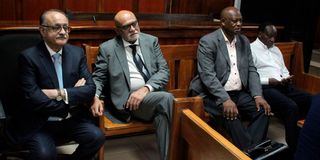Developing story: Iranian President Ebrahim Raisi confirmed dead in chopper crash
Judge upholds dismissal of Anglo Leasing evidence

Anglo-Leasing suspects from right Dave Mwangi, David Onyonka, Deepak Kamani and Rashmi Kamani at a Milimani Court on Thursday, October 11, 2018, during the hearing of a case in which they are charged over the Anglo-leasing scandal.
What you need to know:
- Court stopped the production of electronic evidence obtained from the Swiss authorities relating to the Sh7.1 billion fraud.
- Justice Esther Maina said the documentary evidence did not meet the admissibility threshold.
- Prosecution had failed to produce a certificate indicating how the evidence was procured and processed, as required by the law.
The prosecution suffered a major blow in one of the Anglo Leasing cases after a court stopped the production of electronic evidence obtained from the Swiss authorities relating to the Sh7.1 billion fraud.
Justice Esther Maina said the documentary evidence did not meet the admissibility threshold because the prosecution had failed to produce a certificate indicating how the evidence was procured and processed, as required by the law.
She dismissed a request filed by Principal Prosecution Counsel Eva Kanyuira seeking a review of the court’s decision to strike out the evidence that Director of Public Prosecutions Noordin Haji had intended to use to nail the suspects, including businessmen Deepak Kamani and his brother Rashmi Kamani.
Other suspects in the case are former permanent secretaries Dave Mwangi (Security) and Joseph Magari (Finance), former head of debt management at the Treasury David Onyonka, and Infotalent Ltd.
They are charged with conspiracy to defraud the government of €59,688,250 (Sh7,111,402,461) through one of the Anglo Leasing contracts described as the Kenya E-cops security project.
The evidence was sent to the Ethics and Anti-Corruption Commission (EACC) seven years ago in two sets of documents. One set was contained in a flash disc while the other was shipped through courier service. The evidence was obtained from the Swiss authorities through Mutual Legal Assistance (MLA).
Upholding the lower court’s decision yesterday, Justice Maina said the trial magistrate was correct in striking out the evidence since the prosecution had failed to follow the legal procedure of producing the electronic evidence.
Trial Magistrate Martha Mutuku, in a ruling dated February 18, 2022, noted that the evidence was in electronic form and was not accompanied by a certificate as required under the Evidence Act.
Sought review
Aggrieved by the ruling, the DPP moved to the High Court seeking a review, arguing that the magistrate was wrong to strike out the evidence and that the ruling had prejudiced the case.
“The ruling has far-reaching and adverse ramifications on the proceedings in the anti-corruption case. Unless revised, it would defeat the fair administration of justice,” Ms Kanyuira had told the High Court.
But Justice Maina ruled that it was mandatory for the prosecution to comply with the laws for producing evidence.
“The laws of evidence must apply even on evidence obtained (from foreign countries) through Mutual Legal Assistance. A certificate should have accompanied the evidence,” Justice Maina said.
The basis of her finding are Sections 105 and 106B of the Evidence Act, which requires that for electronic evidence to be admitted in court, the maker should produce a certificate showing how the evidence was processed.
“Without evidence of compliance with sections 105 and 106B of the Evidence Act, it means the documents did not meet the admissibility test,” the judge said.
She observed that a portion of the rejected documents were public documents and was also not certified.
“The law on admissibility must apply. Ignoring the mandatory provision of the Evidence Act in the admissibility of evidence will be an infringement of the accused persons’ rights, hence the upshot for revision is unmerited and therefore dismissed,” Justice Maina said.
The magistrate had upheld an objection that was raised against the admission of the evidence by defence lawyers Ahmednasir Abdullahi, Edward Oonge and Sadia Carren, who had cited legal flaws in the acquisition, retention, and manner of presentation of the evidence.
The lawyers also stated that the documents were “illegally obtained” through a flawed MLA procedure and would be prejudicial to their clients. Mr Abdullahi had also disputed the authenticity of the documents tabled in court by the prosecution, saying due process was not followed when obtaining them.
The EACC lead investigating officer in the case, John Kiilu, had told the court that he intended to use the evidence received from the Swiss authorities to demonstrate how the accused conspired to defraud the government of billions of shilling in the alleged supply of police equipment.





